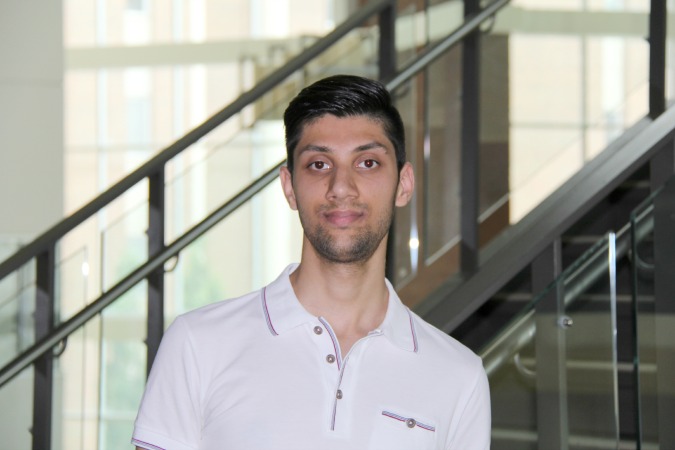
"Confusion was an essential part of the learning experience," says UAlberta electrical engineering graduate and Governor General's Silver Medal recipient Shafi Khan. "When you make a mistake you need to go back and find out where you went wrong and that helps you understand the material better."
Edmonton-When Shafi Khan crossed the stage during his convocation ceremony June 10 he was honoured with a Governor General's Silver Medal for his nearly flawless academic achievements: during the course of his electrical engineering program he earned 38 A+ grades six As and one B+ for a grade point average of 3.9912 out of four.
"It haunts me because it's not a perfect four unless you round it up," Khan says, with a smile and gentle laugh. He isn't going top let that bother him-is goal wasn't to score perfect grades. It was, he says, "to understand the material."
When he encountered challenging courses, he says, he'd just press on.
"I always found value in trying to figure things out myself," he said. "Confusion was an essential part of the learning experience. When you make a mistake you need to go back and find out where you went wrong and that helps you understand the material better."
Khan joins about 800 undergraduate and 200 graduate students graduating from the Faculty of Engineering this spring. In his case, Khan is following his father's footsteps into electrical engineering-because he was enrolled in the engineering co-op program, he also has valuable engineering experience under his belt.
During the five-year degree program Khan worked first at CoSyn Technologies. At the end of his first four-month placement he and his supervisor agreed he was ready to take on greater responsibilities and that he would serve his second placement-for eight months-with the company.
As luck would have it, he arrived at the beginning of a rush project to design wireless sensors for an offshore dredge being used in tailings ponds at Syncrude's oil sands operations. He was part of a team right from the early conceptual stage through to the detailed engineering and wrapping it up on deadline with material requisition lists for the job.
"The timing was great because I got to see the front-end engineering, the detailed engineering and the materials procurement."
His third and final placement was with ATCO electric, working in a project co-ordination role under a project manager. That experience gave exposed Khan to higher-level planning and communication-a key skill for engineers.
He also had an opportunity to work as part of a team planning a small-scale hybrid microgrid system that combined power from solar panels, batteries and the power grid as part of a final year capstone project.
He took part in student life as well, volunteering for the UAlberta chapter of Engineers Without Borders and later serving as chair of the student chapter of the IEEE.
Now, with his degree in hand and paid engineering experience on his resume, Khan is taking time to consider his next steps. An engineering degree, he observes, opens many doors.
One option is to look for work in power engineering. Another is to follow up on a biomedical engineering course he completed, focusing on medical imaging; that may include graduate studies. Or, he says, he may study medicine.
"That's the beauty of an engineering degree," he said. "There are so many possibilities afterward. It opens a lot of doors for a lot of different kinds of careers."